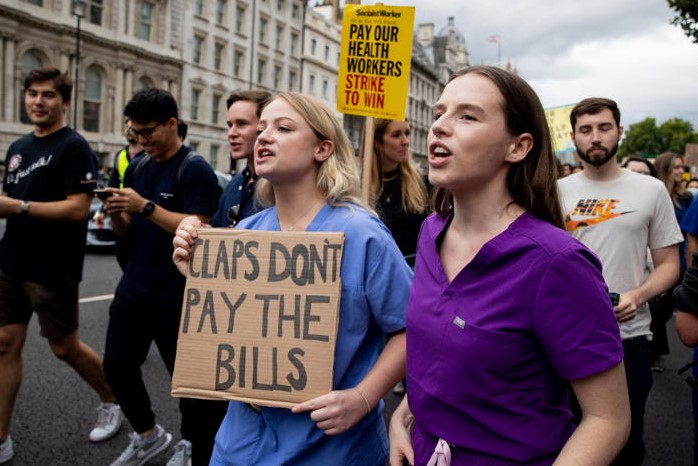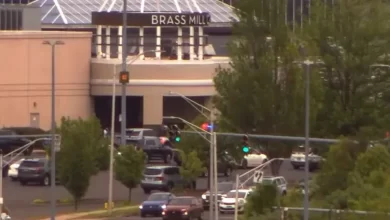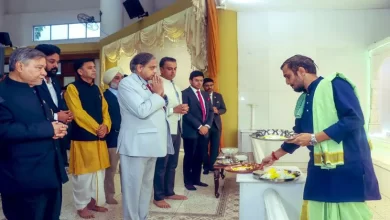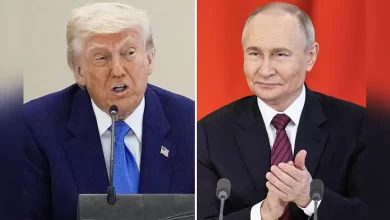UK Junior doctors to stage three-day strike if vote passes

Junior doctors will walk out for three days in March if their ballot for strikes succeeds, the British Medical Association has said.
The union said such action would start with “full walkouts” – including the removal of emergency cover – for 72 hours.
BMA leaders have already said that junior doctors are “very likely” to vote in favour of strikes, as part of a campaign to see pay rise by more than one quarter.
The industrial action by doctors would be the first since 2016, when four periods of industrial action led to almost 300,000 appointments and operations being cancelled.
A 72-hour walkout would be significantly longer than those strikes, which lasted up to 48 hours hours each.
The removal of emergency cover means NHS trusts will be forced to deploy senior medics to do tasks normally performed by juniors.
On Friday, the BMA urged Steve Barclay, the Health Secretary, to meet them, saying industrial action could be avoided via negotiations.
The union said Mr Barclay was the first Health Secretary for over 50 years to continue to ignore all invitations from the BMA to meet with doctors, saying it had made attempts to find a negotiated settlement virtually impossible.
The union insists a rise of more than a quarter is needed because pay has failed to keep up with inflation over the last 15 years.
In the current year, their rise amounted to two per cent, as part of a multi-year deal.
‘We are left with no choice but to act’
Dr Vivek Trivedi and Dr Robert Laurenson, co-chairs of the BMA junior doctors committee, said: “The Prime Minister says his door and that of the Health Secretary, are ‘always open’. But after more than a decade of pay cuts no offer to restore our pay has been made, and all our calls to meet, and letters to the Health Secretary and his immediate predecessors, have been ignored.
“When we are faced with such resolute ongoing silence, and there is no agreed settlement on the table, then we are left with no choice but to act.
“Junior doctors are not worth a quarter less than they were fifteen years ago – nor do they deserve to be valued so little by their own Government.
“Pay erosion, exhaustion and despair are forcing junior doctors out of the NHS, pushing waiting lists even higher as patients suffer needlessly.
“The Government’s refusal to address fifteen years of pay erosion has given junior doctors no choice but to ballot for industrial action. If the Government won’t fight for our health service, then we will.”
Matthew Taylor, the chief executive of the NHS Confederation, said: “Industrial action is already set to take place again for nurses and ambulance staff this month and now the news of junior doctors potentially walking out for 72 hours if their ballot is successful, will be of great concern for health leaders up and down the country.
“We have said time and again that no health leader wants to be in this situation, and we urge the Government to meet with BMA and all NHS unions to reach common ground on pay so that further industrial action can be avoided, and staff concerns properly addressed.
“In the face of increasing winter pressure, a huge hole in vacancies and upcoming strikes in January set to impact services, the Government cannot just sit back and let even more strikes happen when patient care is on the line and the unions must be open to reaching a compromise.”
‘Deeply worrying’
Miriam Deakin, the director of policy at NHS Providers, said: “The announcement by the BMA that junior doctors could begin their action with a 72-hour full walkout in March, with no emergency cover if a ballot is successful, is deeply worrying.
“However, the ballot for industrial action by junior doctors is yet to open and it’s important not to pre-empt the outcome.
“Should junior doctors vote for industrial action, trust leaders will do everything they can to minimise disruption and prioritise the safe delivery of care and services for patients.”
A spokesman for the Department of Health said: “The Health and Social Care Secretary has been clear that supporting and retaining the NHS workforce is one of his key priorities, and that includes our hardworking junior doctors.
“Our multi-year pay deal with the British Medical Association is increasing junior doctor’s pay by a cumulative 8.2 per cent by 2023.
“We have also invested an additional £90 million to provide the most experienced junior doctors with higher pay, increased allowances for those working the most frequently at weekends, and increased rates of pay for night shifts.”







